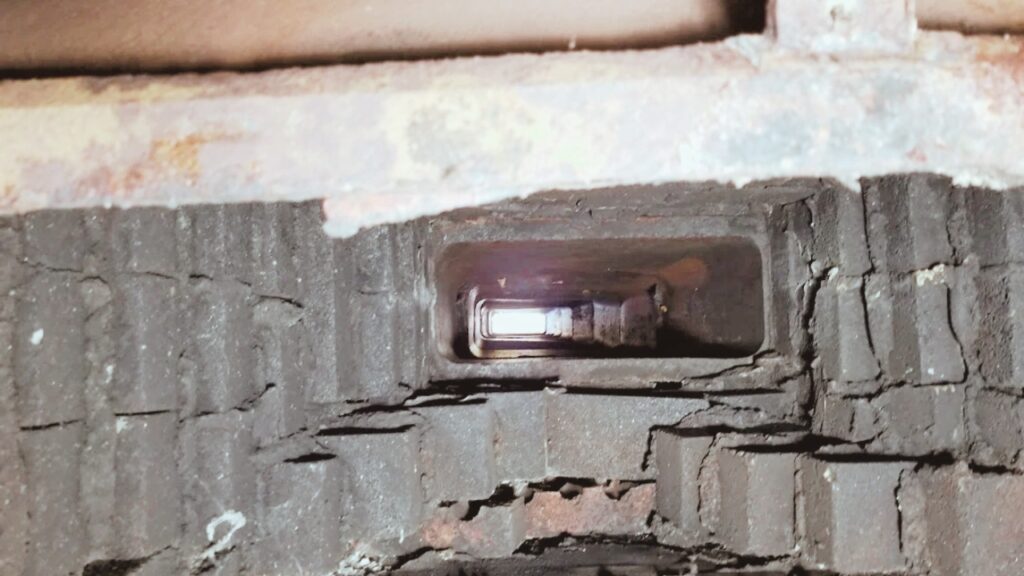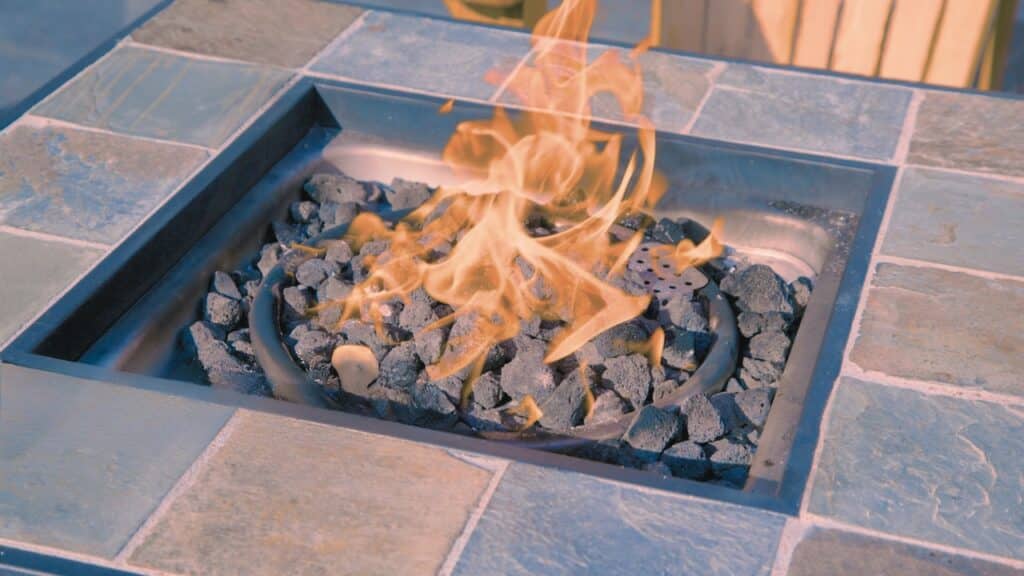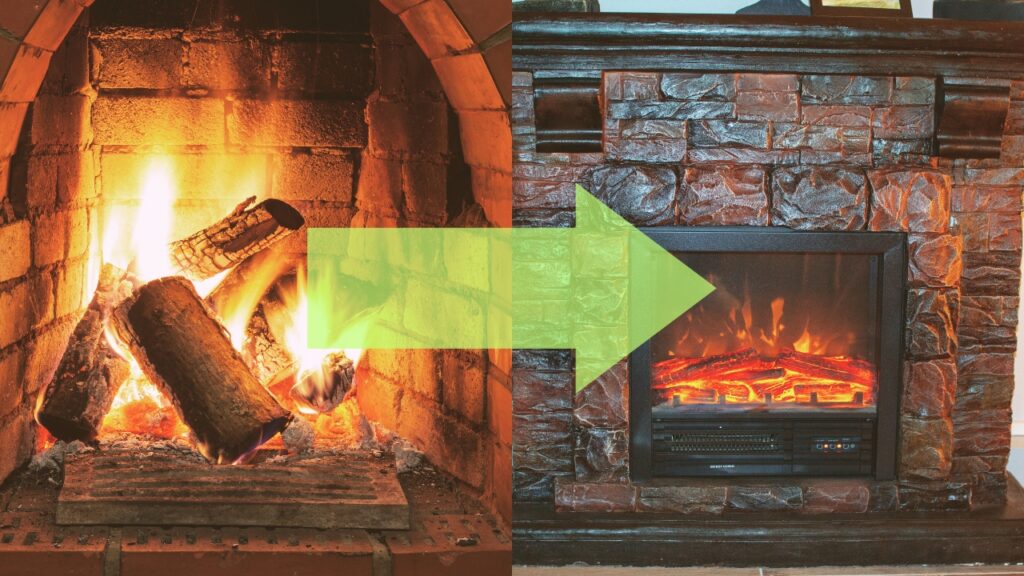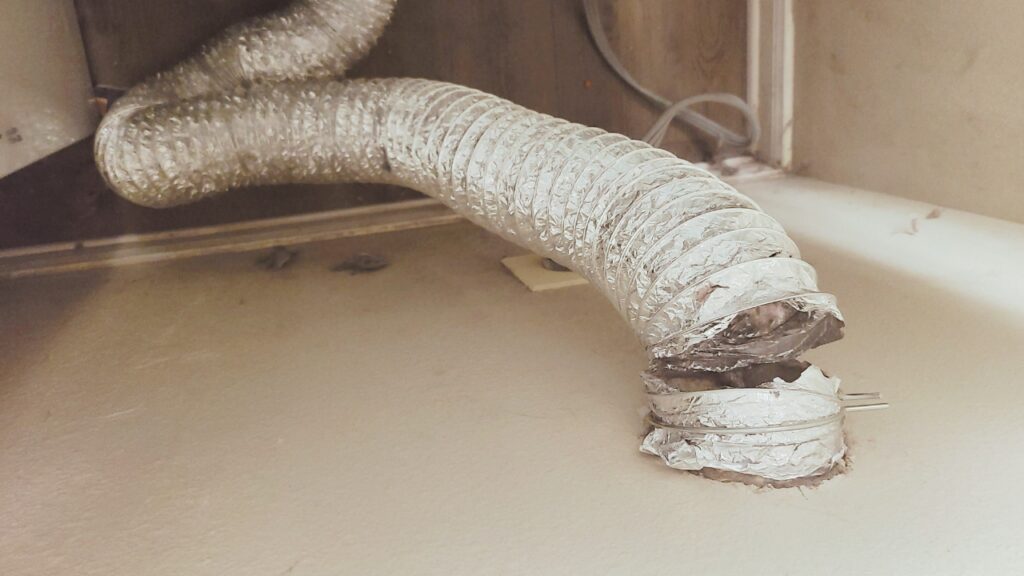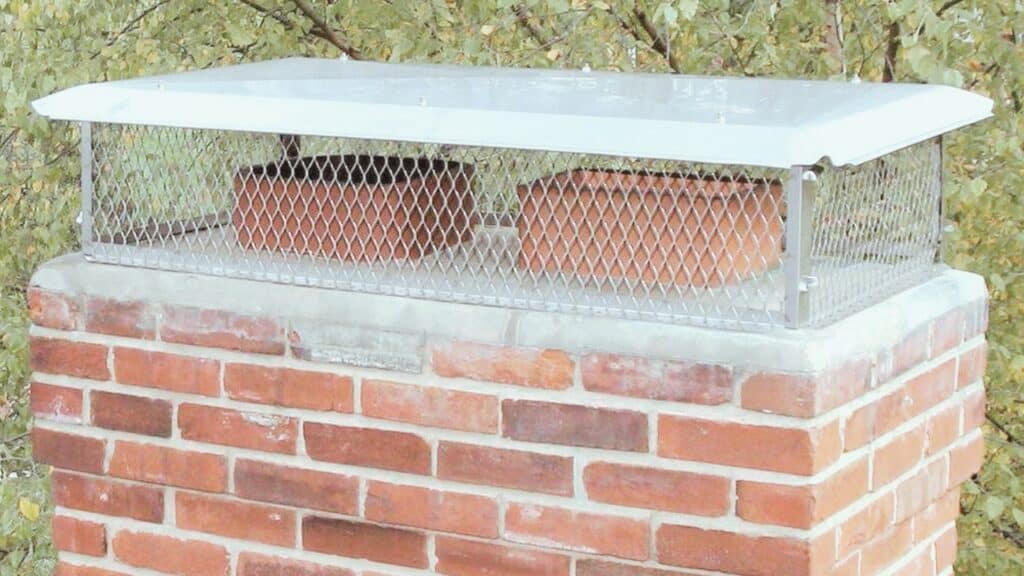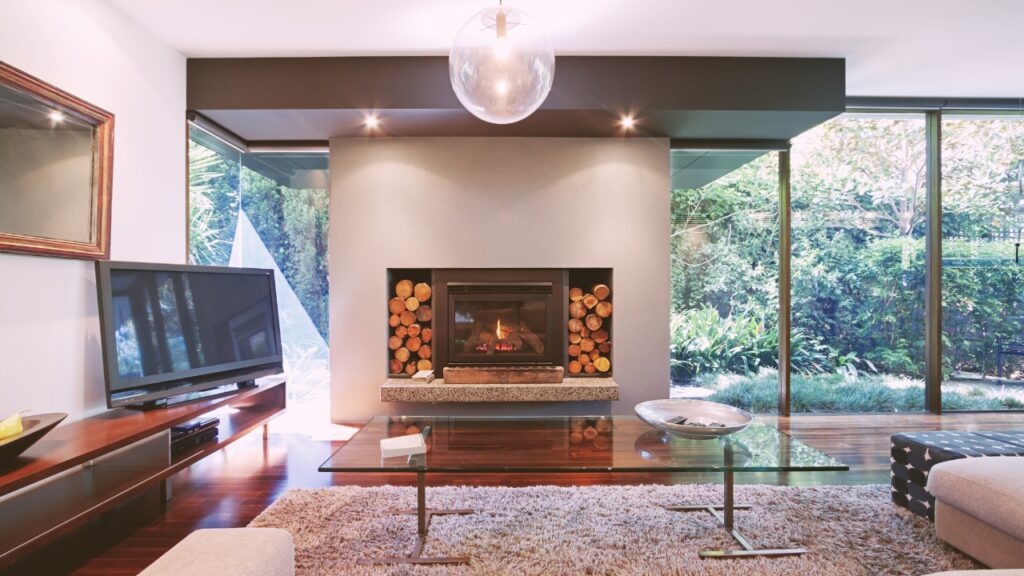If you’re noticing water stains on your ceiling, it’s best to get your chimney inspected for chimney leaks.
The problem with chimney leaks is that they’re hard to notice but, given enough time, can wreak havoc. A leaking chimney can cause structural damage to your chimney, rust various chimney parts such as a chimney damper, and damage your property.
It’s best to get your chimney inspected if you suspect any leaks to avoid hefty service and repair fees in the future.
Adding to the problem is the fact that chimney leaks in heavy rain can occur due to various reasons. Knowing about them can go a long way in avoiding costly damages.
The following article provides you with an easy-to-follow guide on how to spot these issues and avoid them through preemptive measures.
But before we head to that, here’s a comprehensive list of the various causes of chimney leaks and solutions.
1. Bad Chimney Flashing
One of the most recurring causes of a leaking chimney is bad chimney flashing.
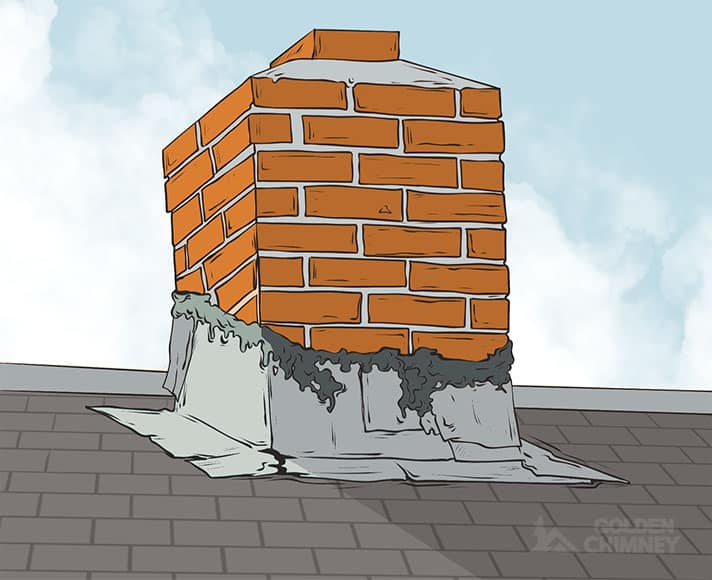
Flashing is a metallic (commonly aluminum) casing that seals that chimney at the point where it meets the rooftop. The purpose is to prevent rain and moisture from entering your chimney from the gap between the chimney and the rooftop.
The problem arises when a chimney flashing, best installed before the roofing shingles, is not installed accurately. But even if your chimney flashing is accurately installed, it can deteriorate over time. Since people aren’t normally aware of its importance, it’s common for a chimney flashing to wrap or wear down, causing leaks inside the chimney through the roof.
If you’re seeing water stains on your ceiling or running down the walls near the chimney, you have a roof leak around your chimney because of a bad chimney flashing.
2. Missing or Damaged Chimney Cap
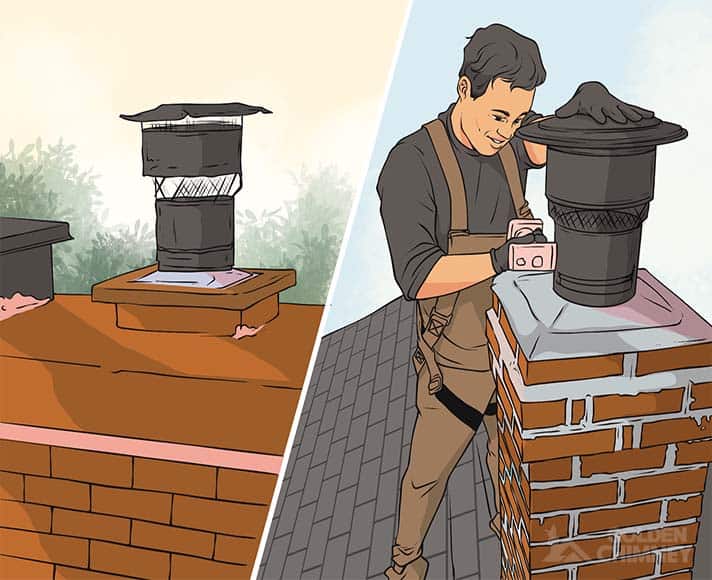
The top of a chimney is open to allow smoke and other exhaust gasses to draft outside. The opening, however, needs to be covered unless you want rain pouring down your chimney.
A chimney cap does the job of covering your chimney flue, protecting it from rain and snow. Not only that, it comes with a mesh that keeps birds and critters from nesting inside your chimney and clogging it while allowing smoke to draft out easily.
If you don’t have a chimney cap or your old one is wrapped, damaged, or blown away during a storm, you’ll have a moisture problem.
——
Do You Need to Hire Chimney & Fireplace Expert?
Get free quotes from qualified experts near you. No commitment required!
——
3. Damaged Masonry
Masonry damage can also result in a leaking chimney. If your chimney is designed such that one part of it gets a harder beating from rainwater than the rest, it can deteriorate sooner. In such cases, the mortar that holds your chimney bricks together starts to form cracks and deteriorate. These cracks then allow water to seep inside the chimney and can cause serious damage.
If your chimney top is shaded, the rainwater absorbed by the chimney bricks doesn’t evaporate quickly enough. It makes the bricks soggy. Eventually, the absorbed water enters the chimney and causes trouble.
Another problem usually occurs in colder regions where the chimney bricks absorb water that freezes during lower temperatures. Since water expands when frozen, it creates cracks in the chimney bricks. Eventually, the water thaws, leaving behind cracked bricks that allow water to leak inside the chimney.
4. Cracked Chimney Crown
A chimney crown is a concrete slab that covers the top of your masonry chimney. It is constructed such that it seals the space created between the chimney flue and the chimney to protect it against moisture and rainwater.
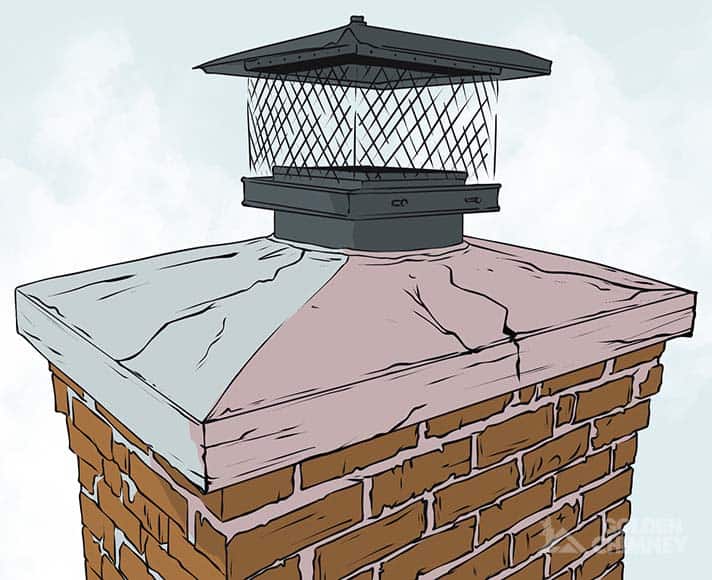
However, if cracked, a chimney crown can’t perform its duty since the water can leak from between those cracks. Sadly, chimney crowns deteriorate eventually because of direct exposure to elements.
If regularly maintained, a chimney crown could last a long time. However, people don’t pay heed to its maintenance. Because of this, the small cracks that could be fixed with a little sealant enlarge to a point where it gets difficult to repair. In such cases, the chimney crown needs to be replaced as soon as possible to avoid severe water damage to the chimney.
Prefabricated chimneys don’t have crowns. Instead, they have metallic chase covers that fit on top of the chimney vent. These chase covers also deteriorate, eventually causing chimney leaks and moisture issues.
5. Chimney Lining Problems
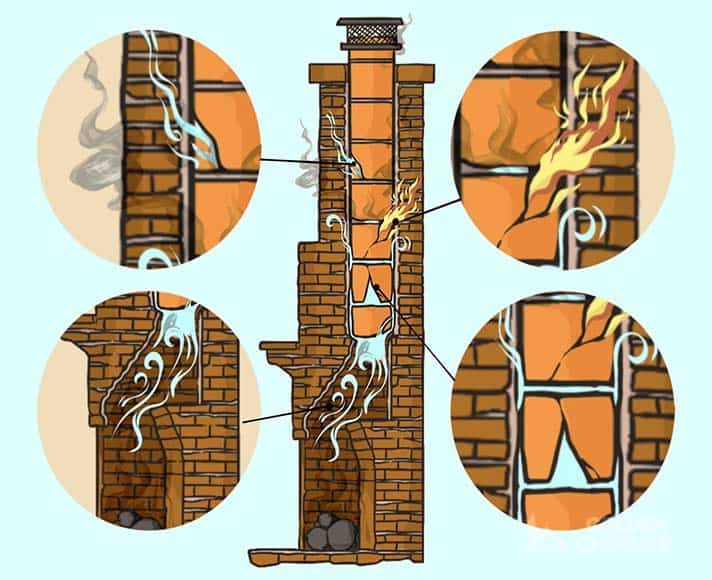
Masonry chimneys are durable yet their brick and mortar structure is not capable of efficiently exhausting smoke out of it. Therefore, a metallic chimney liner (or chimney flue) is installed inside the chimney.
However, if the chimney liner has cracks or doesn’t fit the chimney, it can lead to various problems and increase the risk of a chimney fire.
Such a faulty chimney liner also results in chimney leaks, especially in gas log fireplaces. When the byproducts of gas combustion (including H2O) rise, they escape through these cracks and condense on the cooler brick and mortar structure. The condensed water then falls down the chimney as droplets.
Such a scenario is more common in colder regions and climates.
6. Missing Chimney Cricket
Your chimney is a separate structure that extends out of your roof, leaving gaps and spaces that let water inside. Part of the problem is solved through the proper installation of a chimney flashing, but that’s not enough.
When it rains, water comes down the roof and hits the back of your chimney. While some of the water flows down (as it should), some of it remains, creating a little puddle. This puddle eventually causes damage to the back of your chimney, causing leaks.
To avoid this problem, a triangular structure called a chimney cricket is constructed at the back of your chimney. The chimney cricket diverts the water following down the roof, allowing it to flow into the gutters and preventing pooling at the back of your chimney.
So, if you don’t already have a chimney cricket installed, it could be the reason why you’re facing chimney leaks.
7. Bad Chimney Repointing
A masonry chimney is durable, but eventually, the mortar joints that keep the whole structure intact begin to decay, and spaces are created in between the bricks. This not only causes chimney leaks but also puts the chimney structure at risk.
The decay occurs due to direct exposure to the elements. In the colder climates, the water absorbed by the chimney mortar freezes and thaws creating cracks that also lead to chimney leaks.
Chimney repointing is done to renew the outer mortar joints, which not only helps keep the water from getting inside the chimney but also improves the structure and look of the chimney. However, if ignored, the damaged mortar joints can further decay and harm the chimney structure to the point where repointing is not enough. In such cases, the chimney needs to be rebuilt.
8. Clogged Gutter
If everything’s fine, the rainwater from your rooftop should flow down into the gutter. But if your gutter is clogged, that water will spill outside, resulting in chimney leaks. However, if your gutter overflows during heavy rain, you probably need to get a larger or an additional downspout.
A gutter has several connections that need to be sealed. If not, they can leak and cause water damage to your chimney.
——
Do You Need to Hire Chimney & Fireplace Expert?
Get free quotes from qualified experts near you. No commitment required!
——
Warning Signs of Water Dripping Down the Chimney Flue
Now that you’re aware of the various causes of a chimney leak, it’s time to know how to spot a chimney leak. It’s important because the sooner you spot a chimney leak, the sooner you’ll get it fixed and avoid serious damage to your chimney and your home.
Weird Odor From the Fireplace
When there’s a chimney leak, the water droplets dampen the fireplace. This leads to a weird, musty odor that’s quite irritating. If you notice such a smell from your fireplace, immediately get your chimney inspected for leakage.
Water Dripping Sounds
If you’re noticing sounds of water dripping down your chimney, that means you either have a bad chimney flashing or a cracked or faulty chimney liner that’s causing condensation. Whatever the cause, a leaking chimney should be dealt with immediately to avoid further damage to your chimney or house.
Moisture Around the Chimney
If your chimney is not properly ventilated, you’ll have moisture around your chimney. A bad flashing or condensation can also lead to a moisture problem inside the chimney. Another reason why you might notice moisture inside your chimney is salt contamination.
Regardless of the source, moisture inside a chimney can cause damage and cost a lot in repairs.
Water in the Fireplace
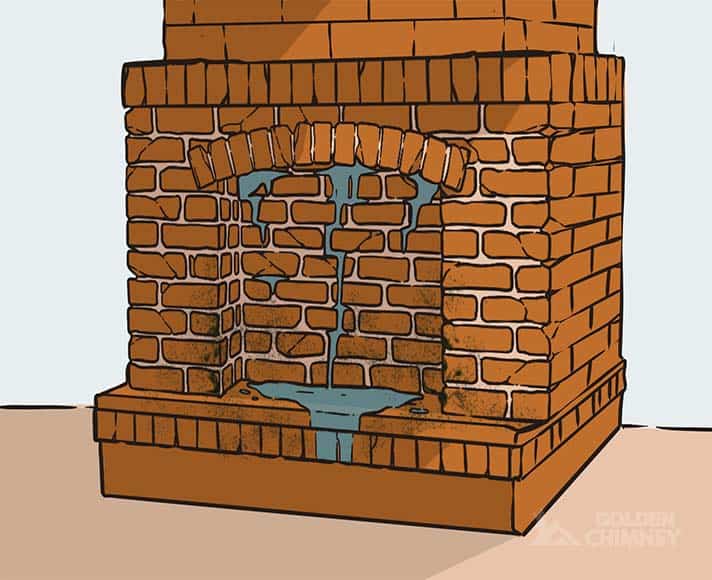
A clear sign of a leaking chimney is water inside your fireplace. Even if the water is not visible, you can notice that your fireplace is damp. You’ll have trouble igniting the fire, and once ignited the fire will be weak, and the combustion will be improper due to the increased moisture content. You’ll also notice dense smoke because of the moisture.
Water Stains
Water stains on your ceiling mean that water is pouring down from a faulty chimney flashing. You might also notice water stains dripping down walls close to the chimney. The water will eventually discolor the ceilings, and you’ll also notice bubbles in the ceiling plaster.
If the problem is not dealt with, over time, you’ll start to notice considerable damage to your attic from the leaking water in the form of molds and structural damage.
Cracked Masonry
If your chimney bricks or mortar are cracked or have gaps, water will enter and cause a chimney leakage. Water leaking through the chimney can cause considerable damage to the structural integrity of the chimney as well as various chimney parts. You need to deal with the problem immediately by having your chimney repointed or rebuilt (if the damage is severe.)
Prevention Tips to Keep Your Chimney From Leaking
Is your chimney leaking during heavy rain? Get your chimney inspected and fix any problem that’s causing the leaks. But a better strategy is to prevent your chimney from leaking in the first place. It’s easier, much more convenient, and costs way less than chimney leaking repair costs.
Here’s how you go about preventing chimney leaks.
Schedule Annual Chimney Inspection
It’s important to get your chimney inspected every year, says the National Fire Protection Association (NFPA). The reason is simple: annual inspections help ensure your chimney and all of its parts are in perfect condition, and your chimney is running efficiently.
These inspections are thorough and carried out by certified professionals who check every part of your chimney. And if any broken part or problem is found, they fix it.
From your chimney cap and crown to your chimney flue and damper, all parts of your chimney are inspected and fixed (if any problem is diagnosed.)
If there are any leaking chimney parts, faulty flashing, wrapped chimney cap, any cavity, or anything else that is causing your chimney to leak, annual chimney inspections will help discover them. So that you can fix them before they cause any serious damage.
Regular Unblocking of Gutters
Gutters often get clogged when debris gets stuck inside. These clogged gutters overflow, causing water to leak inside your chimney. You can get an old plastic spatula to clean out the debris and unclog the gutter.
Regularly unblocking your gutters can go a long way in ensuring rainwater does not get inside your chimney.
Masonry Waterproofing and Repairs
A masonry chimney is directly exposed to the harshness of the weather, due to which the masonry deteriorates, creating gaps that allow water to absorb water that leaks inside the chimney.
A proper masonry chimney should have no spaces, and it should be constructed such that it flows water away from itself. If your chimney has missing mortar or if there are visible cracks in your chimney, you should immediately get your chimney repointed by a professional.
A professional chimney repointing job entails that old exterior mortar is replaced with newer mortar and any gaps or cracks are filled.
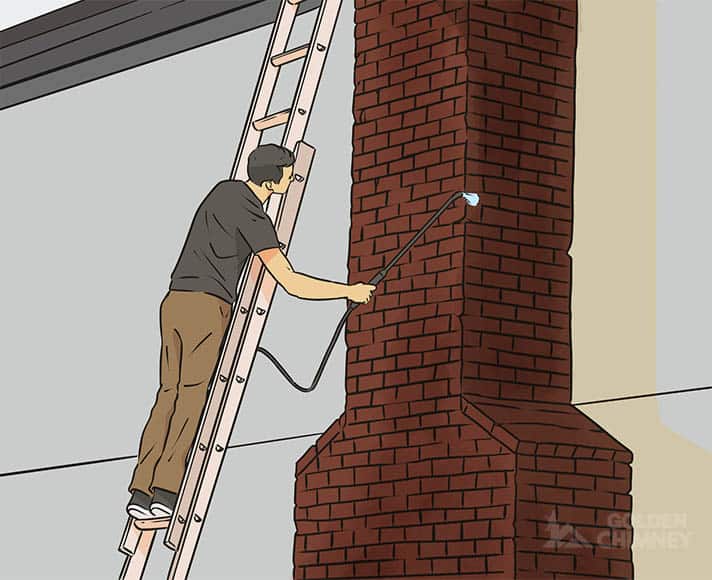
Chimney repointing not only helps waterproof your chimney but also prolongs your masonry chimney’s lifespan and offers it an aesthetically pleasing look.
Once repointed, you should apply a professional-grade water repellent on your chimney to further waterproof it. These waterproofing materials are vapor-permeable, which means they let your chimney breathe.
Most of these waterproofing materials last for over a decade, which means that once coated, you can rest assured that you won’t have to worry about any kind of damage done by water, including cracking of chimney bricks due to the freeze/thaw cycle, mold growth, spalling bricks, etc.
Installing a Chimney Cap
Chimney caps, as mentioned before, are a great way to waterproof your chimney and keep the rainwater out of your chimney flue. A chimney cap encloses your chimney flue from above and directs rainwater and snow away from it.
Chimney caps provide other benefits, such as protecting your chimney from getting clogged by debris, birds, and critters. Moreover, chimney caps have meshes that protect your rooftop from embers that would otherwise fly out of your chimney and damage your rooftop.
Installing Chimney Crickets
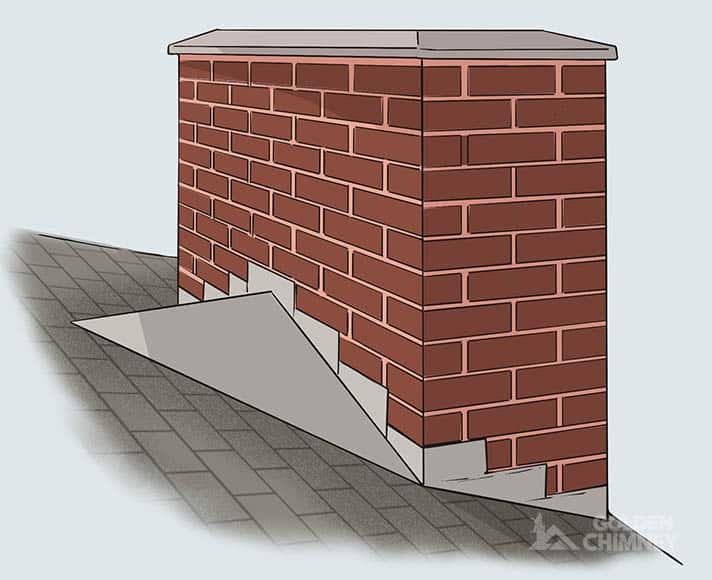
Most people are unaware of the importance of chimney crickets. The back of your chimney, as already discussed, is prone to water damage because of the pooling of water flowing down your rooftop.
A triangular chimney cricket directs water away from your chimney back and into the gutters.
Not all chimneys require a chimney cricket. However, if your chimney is wider than 30″, you should get a chimney cricket installed.
When getting your chimney cricket installed, make sure that the dimensions are accurate for the best results. A steeper rooftop requires a wider chimney cricket.
——
Do You Need to Hire Chimney & Fireplace Expert?
Get free quotes from qualified experts near you. No commitment required!
——
Does Homeowners’ Insurance Cover Chimney Leaks?
Homeowners’ insurance usually covers damages caused by events that are sudden or unforeseeable such as lightning strikes, flash floods, etc. Chimney leaks, however, don’t fall under such a category.
Since a chimney leak usually occurs due to normal wear and tear or lack of regular chimney maintenance, homeowners’ insurance doesn’t usually cover such damages.
Having said that, you can build a case to get your insurance, especially if you’ve done regular chimney maintenance. But that is only possible if you’ve had annual chimney inspections from certified professionals and done regular maintenance of your chimney.
If that’s the case, you can hire a professional chimney sweep service to inspect and diagnose the cause of a chimney leak. The chimney sweep service will create a detailed report with photographic evidence pointing to the exact cause/s of the leakage.
You can then forward the report to your insurance company. And if the cause was something unexpected (not under your control), your insurance will most likely cover the cost of the repairs.
The Takeaway
Chimney leakage is a serious business and, if discovered, should be taken care of immediately. Water leaking into your chimney causes a myriad of issues, such as rusting of chimney parts e.g. chimney damper, deterioration and crack formation in the mortar joints and chimney bricks, mold growth, and property damage, to name a few.
If ignored, the damages can cause you a lot of trouble and cost a lot to fix.
It’s best to prevent chimney leaks by taking precautionary measures such as installing a chimney cap and chimney cricket, getting your chimney masonry waterproof, and getting your flashing inspected and repaired.
However, if you notice any signs of a leaking chimney, such as water stains on the ceiling, sounds of water dripping, the damp odor coming from the firebox, etc.. Hire a professional chimney sweeping service to get your chimney inspected and repaired.
Not only will it save you a lot of money, but it also helps you present a solid case to claim insurance if, for any reason, damages do occur.

